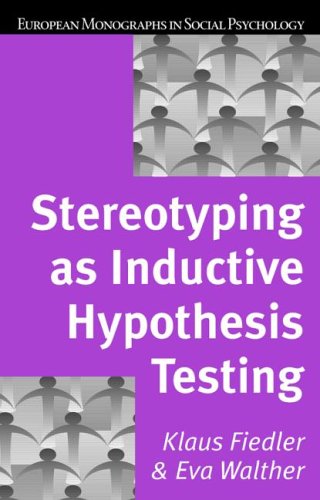

Most ebook files are in PDF format, so you can easily read them using various software such as Foxit Reader or directly on the Google Chrome browser.
Some ebook files are released by publishers in other formats such as .awz, .mobi, .epub, .fb2, etc. You may need to install specific software to read these formats on mobile/PC, such as Calibre.
Please read the tutorial at this link. https://ebooknice.com/page/post?id=faq
We offer FREE conversion to the popular formats you request; however, this may take some time. Therefore, right after payment, please email us, and we will try to provide the service as quickly as possible.
For some exceptional file formats or broken links (if any), please refrain from opening any disputes. Instead, email us first, and we will try to assist within a maximum of 6 hours.
EbookNice Team

Status:
Available4.8
38 reviews
ISBN 10: 0863778321
ISBN 13: 9780203641538
Author: Klaus Fiedler, Eva Walther
Traditional social hypotheses have a built-in tendency to verify themselves and so involuntarily resist attempts at stereotype change or correction. This is the insight demonstrated and discussed as the start point for an alternative approach to the problem of stereotyping and hypothesis testing. Stereotyping as Inductive Hypothesis Testing explicates the proposition that many stereotypes originate not so much in individual brains, but in the stimulus environment that interacts with and constitutes the social individual. This cognitive-ecological approach is then used to analyse the different aspects of language, sign systems and communication that can implicitly govern hypothesis testing procedures and lead to circular or reinforcing outcomes. The authors describe factors in tests such as judgment, memory and expectation and go on to suggest viable ecological learning approaches to them. An original research project based on a classroom situation is used to demonstrate and verify findings. The cognitive-ecological approach is then contextualised in relation to both the traditional approaches it can replace and the contemporary statistical sampling practices it can improve. Written with a profound understanding of the link between theoretical rigour and good empirical research practice this monograph will be invaluable to anyone with an interest in stereotyping or who wishes to enhance the reliability and self-awareness of their research methods.
1. The Topic of Social Hypothesis Testing
Don’t Round Up the Usual Suspects
A Short Story
2. Stereotyping As a Cognitive-Environmental Learning Process: Delineating the Conceptual Framework
Locating the Present Approach In a Theoretical Framework
Locating CELA In Relation to Modern Stereotype Research
Summary
3. Learning Social Hypotheses: Stereotypes As Illusory Correlations
A Case for Studying Stereotype Acquisition Before Measuring the Consequences
Stereotype Learning In the Illusory Correlation Paradigm
Distinctive Assets of an Environmental-Learning Approach
Similarity-Based Stereotype Learning
Summary
4. The Auto-Verification of Social Hypotheses
Hypothesis Testing In the Active Information-Search Paradigm
The Auto-Verification of Social Hypotheses
Can Sampling Processes Provide a Remedy Against Stereotypes?
Is Positive Testing Irrational?
Further Implications of Auto-Verification
Summary
5. Information Search In the “Inner World”: Stereotype Origins In Constructive Memory
Comparison of Information Search In Memory and In the External World
Constructive Memory
Empirical Evidence
Memory for Reasons for or Against a Hypothetical Judgment
Summary
6. Testing Social Hypotheses In Tri-Variate Problem Space: Further Variants of Environmental Stereotype Learning
Recapitulating the Premises and the Current Status of Analysis
Stereotyping In a Tri-Variate Problem Space
The Limited Value of Experimental Strategies for Contextual Learning
Summary
7. Explicit and Implicit Hypothesis Testing In a Complex Environment
The Simulated School Class Environment
Judgment Biases In the Classroom: Three Types of Stereotypical Expectancies
Summary
8. The Vicissitudes of Information Sampling In a Fallible Environment: An Integrative Framework
The Superordinate Theme of CELA
A Sampling Approach to Understanding Psychological Relativity
CELA Findings and the Sampled Information Input: An Integrative Summary
The Ubiquity of Sampling Biases Revisited
9. Epilogue: Locating CELA In Modern Stereotype Research
The CELA Message In Hindsight
Stereotype Learning and Stereotype Accessibility
References
inductive stereotype
inductive stereotype definition
is stereotyping inductive reasoning
the whole idea of a stereotype is to simplify
stereotyping books
Tags: Klaus Fiedler, Eva Walther, Stereotyping, Inductive